The plastics specialist Pöppelmann from Lohne in Lower Saxony is convinced that the economic model of the future lies in a consistent system change to a circular economy to effectively achieve resource conservation and climate protection when processing plastics. The TEKU® division, which specializes in products for professional horticulture, provides an excellent example of increased sustainability with its Circular360 closed-loop plant pots: the pots are made of 100 percent post-consumer recyclate (PCR) and are 100 percent sortable in the recycling process after use.
In this article, Sven Hoping, Division Manager Sales Pöppelmann TEKU, and Benjamin Kampmann, an environmental specialist with a focus on circular economy and climate at Pöppelmann, talk about concrete sustainability goals of the corporate group, contributions from the TEKU division and innovative ideas for the horticultural sector, which will be presented for the first time at IPM Essen.
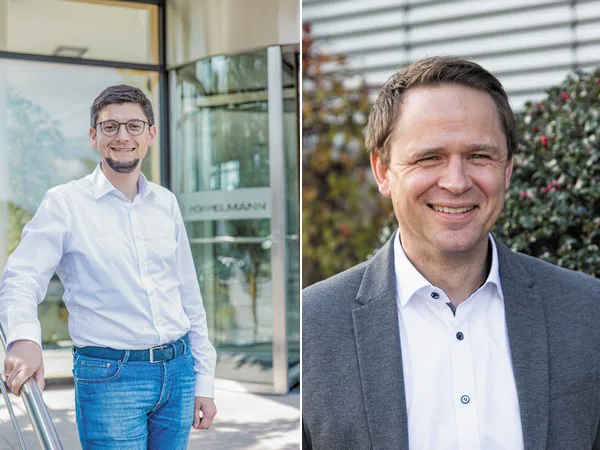 Benjamin Kampmann, a facilitator with a focus on circular economy and climate at Pöppelmann, and Sven Hoping, divisional sales manager Pöppelmann TEKU®.
Benjamin Kampmann, a facilitator with a focus on circular economy and climate at Pöppelmann, and Sven Hoping, divisional sales manager Pöppelmann TEKU®.
At the Pöppelmann Group, and therefore also at the TEKU division, increased resource conservation and reduction of greenhouse gas emissions are at the top of the agenda. What specific goals are you pursuing, and how can they be achieved?
B.K.: In 2018, Pöppelmann launched the 'PÖPPELMANN blue®' initiative to bundle all activities across the company, which stands for more resource conservation and climate protection. We consistently continue along this path and have set ourselves ambitious goals: By 2025, all packaging produced in our company should be 100% recyclable. We want to cover as much of our total material requirement as possible with post-consumer recyclates (PCR) or other recyclates, including post-industrial recyclates (PIR). To this end, we develop and produce products in all divisions that close the loop through recyclability and are manufactured with a very high proportion of recyclates. For a long time, our main focus has been on increased resource conservation. Now we are going one step further: in order to improve our contribution as a company to climate protection, we first calculated the greenhouse gas emissions of the entire company, the so-called Corporate Carbon Footprint (CCF), with the support of a specialized consulting firm, and set precise target values (scientifically based objectives) for the reduction of our greenhouse gas emissions by 2030.
S.H.: As far as we know, such a comprehensive professional calculation with external partners is unique in the industry. We now know very precisely which part of our actions as a company causes which emissions and can start there. The study showed that just under 10% of emissions are caused by our production itself. 90% are indirect emissions affecting upstream or downstream processes. Nearly 80% of total emissions are caused by the materials we source and by the disposal of our products after use, in particular by incineration. Thus, with consistent recycling management, for example, by increasing the use of recyclates and a sustainable "end-of-life" solution for our products, we can have the greatest impact on reducing greenhouse gas emissions from plastic products - confirming the path Pöppelmann has taken.
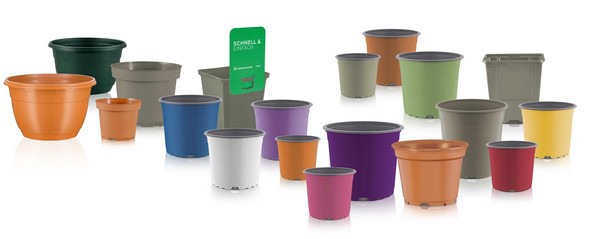
Recycling: TEKU® Circular360 plant pots consist of 100 percent post-consumer recyclate (PCR) and are 100 percent recyclable in the Recycling process after use.
Pöppelmann also had the effectiveness of the circular economy scientifically researched using the specific example of TEKU Circular360 plant pots. What were the results of this study?
B.K.: When determining the Corporate Carbon Footprint (CCF), we look at Pöppelmann as a whole. We also had the Fraunhofer Institute UMSICHT carry out a life cycle assessment (LCA) for plastic products in a circular material system, analyzing the impact of the circular economy versus the linear economy using the specific example of TEKU Circular360 plant pots. This product range includes closed-loop plant pots made up of 100 percent post-consumer recyclate (PCR) in the used plastic, which can be fully recycled again after use. The study now also scientifically proves that the Circular360 product range contributes to greater resource conservation and climate protection. In the circular economy made possible by our pots of post-consumer recyclate, used plastic is now used an average of 2.7 times. This is a clear success compared to the linear economy, where plastic is only used once. However, we are not yet satisfied with this circularity and want to further increase average material utilization.
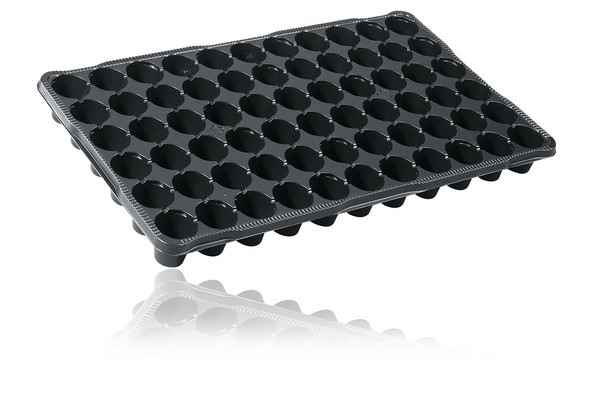
IPM novelty: TEKU® presents 14 new propagation trays that are adapted to automated and individual processes in horticultural businesses and contribute to greater efficiency.
How is Pöppelmann dealing with these results, especially in the TEKU division, which develops and produces products for professional horticulture?
B.K.: To make effective use of the circular economy, our biggest challenge in conserving resources and reducing our emissions, our product development in all divisions engages in concepts that take into account the entire life cycle of an item under the keyword eco-design. They go from the cradle, i.e., the source of materials, to disposal. Wherever possible, we focus from the outset on using recycled materials instead of virgin material to reduce emissions from purchase and on recycling-friendly design to significantly reduce the "end-of-life" emissions of used plastic products caused, for example, by incineration.
S.H.: The TEKU division, with its products for the green industry, is pioneering a true circular economy here with the Circular360 product range. And development continues: we are currently working on a sustainable alternative to black plant pots, which currently cannot be recycled. In this way, we will soon enable even more customers to enter the circular economy. We want to present the state of our developments during the IPM. Instead of throwing away their used products, many of our customers are already making their plastic products used in horticulture available to us as materials again. We help them find a local recycler who processes the plastic waste to type and sends it back to us - saving not only transport capacity but also emissions.
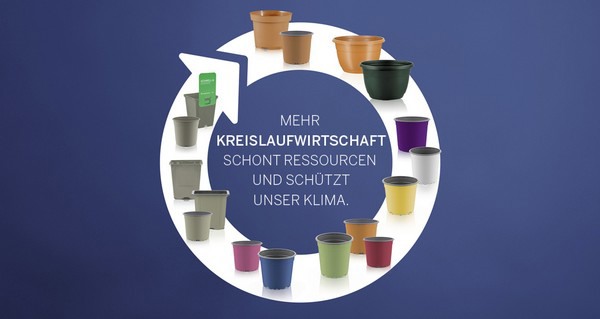
Even more true circular economy: Pöppelmann TEKU® is committed to consistent system change for greater resource conservation and climate protection.
How does Pöppelmann TEKU ensure that these scientific results reach the industry and spur concerted action?
S.H.: The Circular360 plant pots have been around since 2018, and we have set a new standard in the markets with them. Many customers have long followed suit: We now generate more than 60% of our sales with the items that are 100% PCR. At our wholesale conference, which took place for the first time at our premises in Lohne in December with customers from all over Europe, we made the results of the study insightful and tangible during workshops. This led to a real "aha" effect, which we also want to make possible for visitors to our stand at IPM. We notice that awareness of recyclability is growing and has now become an important topic in several European countries - a good precondition for putting the circular economy into practice together with even more customers.
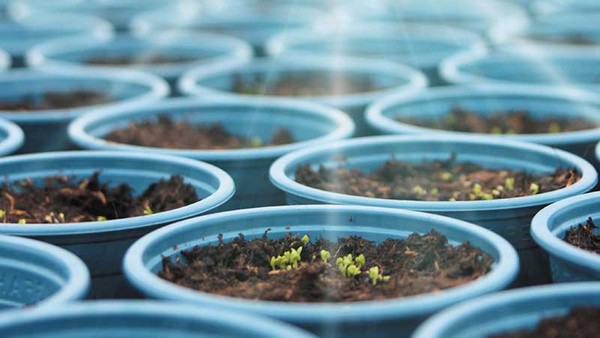
Plant pots Circular360: use of PCR and sustainable "end-of-life" solution reduce greenhouse gas emissions from plastic products
With the high sustainability goals you are pursuing, how do you ensure a permanently sufficient availability of recycled materials?
S.H.: In terms of material availability, we continue to benefit from our close relationships with suppliers on a partnership basis and our willingness to always procure and store sufficient material, even in high-price phases, to be an absolutely reliable partner for our customers. To ensure this remains so in the future, we are looking at expanding material sources in various ways - and thinking big: among other things, we are significantly expanding the number of our suppliers at home and abroad. We are also working on solutions to accommodate other PCR sources that are not currently being processed.
B.K.: To achieve this, we are concentrating on the further development of machine and process technology throughout the Pöppelmann Group so that we can also process PCR material of varying quality or PCR material that cannot be used today into first-class products. There are also some exciting developments in product design.
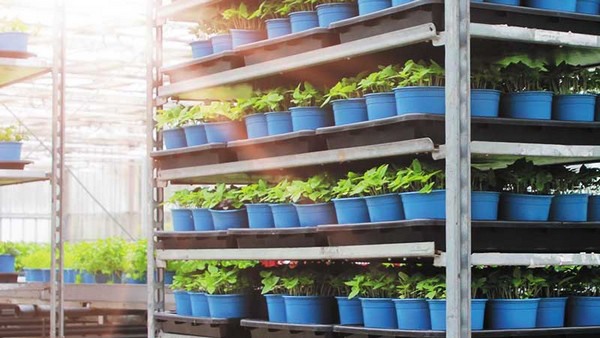
Saving more resources together: Pöppelmann TEKU® now generates more than 60 percent of its sales with its 100 percent PCR sustainable plant pots.
What other innovations can visitors expect at the horticultural trade fair IPM, and how does Pöppelmann TEKU see the future?
S.H.: In addition to the focus on an even more true circular economy, we are presenting numerous new products in the existing TEKU portfolio at IPM, including no fewer than 14 new staking trays that are tailored to automate and individual processes in horticultural businesses and thus contribute to greater efficiency for our customers. As part of our Pöppelmann digital initiative, we are presenting innovative ideas that will make processes in the green industry and cooperation with us easier in the future. Our "Holo-Lens" idea presents glasses that, by interacting with coded TEKU® plant pots, can also support unskilled workers in their work in horticultural businesses, for example, in recognizing plants ready for sale. To facilitate stock management for our customers, a digital logistics solution based on the Kanban system could take over the automatic re-ordering of plant pots in the future. With these ideas for the future, we are looking for pilot partners to further develop this approach with us.
The consistent commitment to resource conservation and climate protection defines the future of TEKU and the entire Pöppelmann Group. Over the past two years, we have been explicitly praised by our customers for our reliability. This praise related not only to our quality, our ability to deliver, and our service - but also to reliable statements. All this remains at the heart of our performance in the future.
For more information:
Pöppelmann 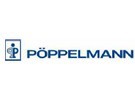
www.poeppelmann.com
